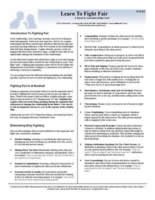All Couples Should Learn To FIght Fair. Here's How
Check out our mini-guide on how to fight fair, and stop letting badly handled conflict cause pain in your relationships. Download it NOW!
Search Our Network Of Business and Personal Development Sites
Are you getting open and honest communication from your staff? Here's how to fix it.
Managers - Are You Getting The Information You Need To Do A Good Job?! by Robert Bacal
It's a very odd question...but an important one in government. One of the worst feelings a government manager, executive or supervisor can experience is that dreadful sinking feeling that occurs when it is discovered that something bad you should have known about wasn't conveyed to you in a timely and useful way. It could be a complaint from a member of the public that wasn't reported to you, but ended up in the Minister's office. It could be that a pet project of the person you work for is going badly, but nobody bothered to tell you, so you could give an accurate report or "heads-up" to your boss. Or, it could be some sort of personal problem on the part of a staff member that is affecting the work of your unit, unbeknownst to you.
You can't be everywhere and you can't know everything, but not getting the bad news you need when you need it is a very major problem. You look foolish, ignorant, "out of it", regardless of who might be at fault for the lack of communication. Not a great way to enhance a developing career particularly if your boss is also embarrassed. In other practical terms, that which you know nothing about cannot be addressed, and timeliness is important. Sometimes late is just as bad as never!
Why People Don't Tell
Before we talk about some specific steps you can apply to encourage people to give you the bad news when you need it, it is good to understand some of the reasons why people hesitate in doing so. There are different sets of reasons....individual psychological reasons; reasons pertaining to your own everyday behavior; and organizational culture reasons.
People vary in the degree to which they are comfortable communicating bad news. Some people, for example, have difficulty tolerating conflict and associate bad news with conflict situations. Others will hesitate because of embarrassment--because they feel responsible (even when they may not be). Others may feel that they can "fix" the problem before it has to go to you. The same processes that apply to family "secrets" and bad news apply in the workplace. Unfortunately, there isn't much you can do to counteract these individual differences directly.
The second source of hesitancy is your own behavior If you tend to display your emotions easily, you may be intimidating staff when there is bad news to share...you may simply be making it easier for them to keep quiet and hope it blows over, rather than addressing and fixing the problem. Obviously you wouldn't deliberately set up such a scenario, but your personal style may be sufficiently emotional to scare off at least some people.
If your focus is on blame rather than on problem-solving, you will also be less "in the loop". Managers that are perceived as problem-solvers are less likely to intimidate staff into silence.
Even your general communication approach affects what you will hear and not hear. If you are generally attentive and appear interested, then you will be more likely to get what you need. If you convey the idea that you are busy, overwhelmed, uninterested, then staff are more likely to try not to "bother you", with what, to them, might appear like little things. Sometimes those little things are things you really need to know about in advance.
Organizational culture issues can also intimidate staff into silence, and they line up pretty much like the factors we described regarding your own personal behavior If your larger organization has a history of avoidance of conflict, secrecy, blaming, intimidation, and denial, then it is more likely that staff will keep silent as much as possible.
What Can You Do?
The best way to encourage more sharing of bad news is to address your own behaviors. Below are a number of suggestions.
1. Learn the distinction between blame, and problem-solving. When bad news comes around, first address the problem (e.g.. how can we get the project done), rather than spend your time determining who has screwed up. If it is absolutely necessary to determine where the fault occurred, don't look just for a person to "hang the problem on"...use the incident as an opportunity to PREVENT further occurrences rather than to blame. This kind of process tells staff they aren't going to get dumped on if they bring you bad news.
2. Consider your own emotionality of expression. Some people express both their pleasure and their displeasure very openly...others come across as more reasoned and calm. There isn't really a right or wrong, here, but if you tend to be on the flamboyant open side emotionally, consider toning it down a bit, generally. Why? Because strong expressions of emotion can frighten people, particularly those over whom you hold some degree of power.
3. Work on creating a culture that values both finding and solving problems. The best way to do that is to role model the attitude with staff, consistently. When YOU make a mistake, share that mistake, accepting responsibility, and model the problem-solving process. That might mean explaining what actions you will be taking to avoid making the same error again. That's what you want from staff, and you need to demonstrate it consistently.
4. Some organizations like to open staff meetings with a discussion of some "triumph" that has occurred since the last meeting...a job well done, or some other success. The idea, of course is to celebrate accomplishments, and that makes sense. Consider though, that while this may be somewhat morale heightening, it's effect is limited if there are other unspoken problems and mess-ups occurring. Successes do not counter-balance screw-ups. What really increases morale is fixing the screw-ups so they don't happen anymore.
Another approach is to open each meeting with a "hassle-hunting" process, where you spend a small amount of time identifying problems, complaints, etc. that have come up since the last meeting, and working to overcome them. This technique is used in some hospitality sector organizations (like hotels). Again the focus is on bringing problems to light so they can be fixed. Of course, you can still celebrate successes, but you will contribute to a more open culture by encouraging continuous improvement.
5. Managing understanding is an important part of ensuring that you get the bad news you need. One reason staff don't come with bad news is that they do not understand the significance or importance of some things that occur. Your view of events may be different..what may seem important for you may seem trivial to staff. So it is always useful to clarify what kinds of information you need, when you need them, and WHY you need them. The why is important because it helps cement your needs psychologically, in the minds of your staff...it helps them remember.
6. Related to managing understanding is determining the kinds of information your boss needs...after all part of your job is to provide information to him or her, just as part of your staff's job is to inform you. So it is useful to take the initiative to clarify the information needs of your boss, particularly with respect to bad news. Then, pass on what you have learned to your staff.
7. Finally, if your organization has a history of secrecy, avoidance of problems and conflict, recognize that it is going to take some time for that culture to change. The key here is your consistency, and how you handle bad news. Make it worthwhile and safe for staff to talk to you and you will get what you need when you need it.
 Manage Conflict - Resolve Conflict - Prevent Conflict
Manage Conflict - Resolve Conflict - Prevent Conflict 

